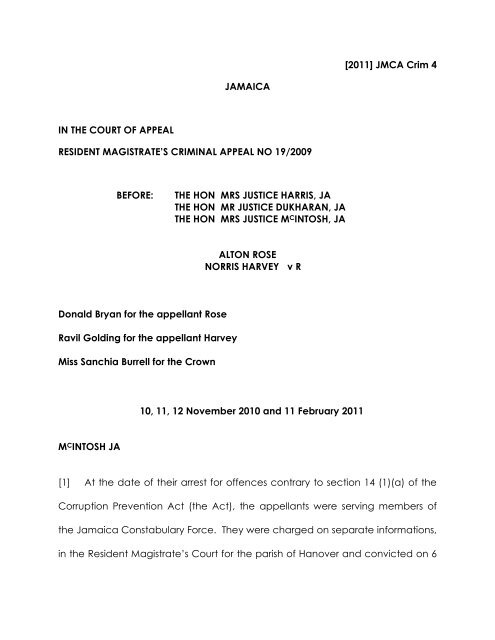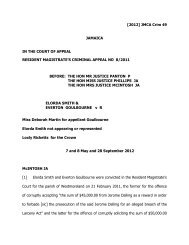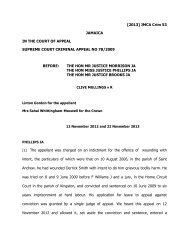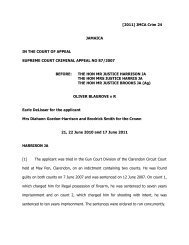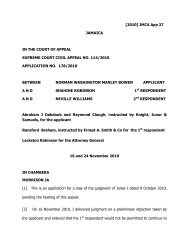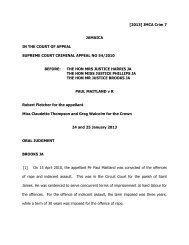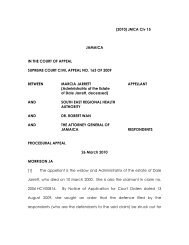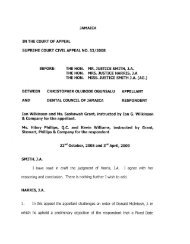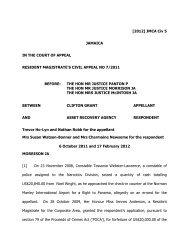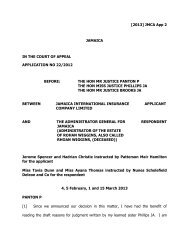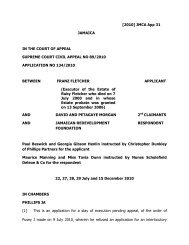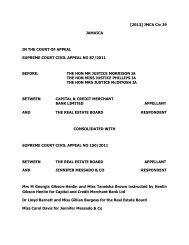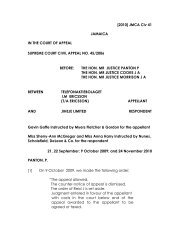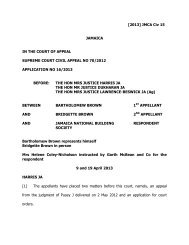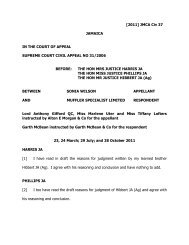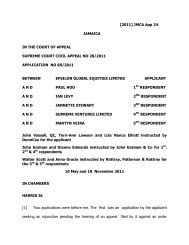Rose (Alton) & Harvey (Norris) v R - The Court of Appeal
Rose (Alton) & Harvey (Norris) v R - The Court of Appeal
Rose (Alton) & Harvey (Norris) v R - The Court of Appeal
Create successful ePaper yourself
Turn your PDF publications into a flip-book with our unique Google optimized e-Paper software.
IN THE COURT OF APPEAL<br />
JAMAICA<br />
RESIDENT MAGISTRATE’S CRIMINAL APPEAL NO 19/2009<br />
BEFORE: THE HON MRS JUSTICE HARRIS, JA<br />
THE HON MR JUSTICE DUKHARAN, JA<br />
THE HON MRS JUSTICE M C INTOSH, JA<br />
Donald Bryan for the appellant <strong>Rose</strong><br />
Ravil Golding for the appellant <strong>Harvey</strong><br />
Miss Sanchia Burrell for the Crown<br />
M CINTOSH JA<br />
ALTON ROSE<br />
NORRIS HARVEY v R<br />
10, 11, 12 November 2010 and 11 February 2011<br />
[2011] JMCA Crim 4<br />
[1] At the date <strong>of</strong> their arrest for <strong>of</strong>fences contrary to section 14 (1)(a) <strong>of</strong> the<br />
Corruption Prevention Act (the Act), the appellants were serving members <strong>of</strong><br />
the Jamaica Constabulary Force. <strong>The</strong>y were charged on separate informations,<br />
in the Resident Magistrate’s <strong>Court</strong> for the parish <strong>of</strong> Hanover and convicted on 6
July 2009, <strong>Alton</strong> <strong>Rose</strong> for the <strong>of</strong>fence <strong>of</strong> corruptly accepting the sum <strong>of</strong><br />
$30,000.00 directly from Kevin Green, as a gift for himself or another and <strong>Norris</strong><br />
<strong>Harvey</strong> for the <strong>of</strong>fence <strong>of</strong> corruptly soliciting the sum <strong>of</strong> $80,000.00 indirectly from<br />
Kevin Green, as a gift for himself or another person. <strong>The</strong> gifts were alleged to be<br />
for doing an act in the performance <strong>of</strong> each appellant’s public function, “to wit,<br />
for releasing from custody the said Kevin Green” whom the appellant <strong>Rose</strong> had<br />
taken into custody for kidnapping.<br />
[2] That same day each appellant was sentenced to a term <strong>of</strong> 12 months<br />
imprisonment at hard labour after which it appears that each gave verbal<br />
notice <strong>of</strong> appeal as the informations were endorsed with the grant <strong>of</strong> bail to<br />
each, “pending appeal”.<br />
[3] <strong>The</strong> trial commenced on 10 March 2009 and continued on divers days<br />
concluding on 6 July 2009, during which time the court heard an opening<br />
statement from the Crown and evidence from witnesses for the Crown, then<br />
heard evidence from the appellant <strong>Rose</strong> and an unsworn statement from the<br />
appellant <strong>Harvey</strong>, in their defence.<br />
[4] In short, the Crown’s case was that on 27 April 2008 the appellants<br />
attended at the home <strong>of</strong> the complainant Kevin Green and took him to the<br />
Green Island Police Station purporting that he would be charged for kidnapping<br />
and larceny. Mr Green was a farmer who had earlier reported a case <strong>of</strong><br />
praedial larceny at the Lucea Police Station, committed at his farm. While at
the Green Island Police Station, the appellants solicited money from Mr Green<br />
and arrangements were made for the money to be handed over to <strong>Rose</strong>. Two<br />
days later, in a sting operation, the money was handed over and <strong>Rose</strong> (a<br />
corporal <strong>of</strong> police at the time), was found by a team <strong>of</strong> police <strong>of</strong>ficers from the<br />
Anti-Corruption Branch (the ACB) in possession <strong>of</strong> $30,000.00 which had been<br />
marked as part <strong>of</strong> the operation. After <strong>Rose</strong>’s apprehension, the appellant<br />
<strong>Harvey</strong>, was pointed out on an identification parade and both were<br />
subsequently charged following a ruling by the Director <strong>of</strong> Public Prosecutions.<br />
[5] It is not disputed that the appellants went to the home <strong>of</strong> Kevin Green on<br />
the morning <strong>of</strong> 27 April 2008 and that <strong>Rose</strong> made enquiries about Mr Green’s<br />
admitted visit to the home <strong>of</strong> one Ricardo Walker, otherwise called Rasta Twin,<br />
at about 3:00 o’clock that morning. Neither is there any issue about the reason<br />
he gave for so doing, namely that he had taken Rasta Twin to the Lucea Police<br />
Station and handed him over there, reporting a case against him <strong>of</strong> praedial<br />
larceny <strong>of</strong> pumpkins from his farm. But whereas Mr Green’s evidence is that<br />
<strong>Rose</strong> told him that he was taking him to the Green Island Police Station to<br />
charge him with kidnapping and larceny, <strong>Rose</strong>, in his sworn evidence, said that<br />
he told Mr Green that the trip to the station was to check out his account as he,<br />
<strong>Rose</strong>, was then unable to make contact with the Lucea Police Station to verify<br />
that Rasta Twin was there.
[6] What transpired at the Green Island Police Station when they arrived there<br />
at about 9:00 o’clock that morning forms the crux <strong>of</strong> the Crown’s case against<br />
the two appellants. <strong>The</strong>re is an <strong>of</strong>fice at the police station described by Kevin<br />
Green as <strong>Rose</strong>’s <strong>of</strong>fice. Mr Green disclosed that while in that <strong>of</strong>fice <strong>Rose</strong> sought<br />
to impress upon him that he was facing serious charges <strong>of</strong> kidnapping and<br />
larceny which would prove to be a costly matter if it went to court – attracting<br />
sums ranging from $400,000.00 to $500,000.00. Mr Green went on to state that<br />
<strong>Rose</strong> told him that it was going to cost him some money and urged him to make<br />
up his mind what he wanted to do. When Mr Green enquired what the money<br />
was for <strong>Rose</strong> said it was to compromise the case with Rasta Twin. He stated that<br />
no sum was discussed at that time but at one point <strong>Rose</strong> told him he was to use<br />
his own conscience. He further asserted that telephone numbers were<br />
exchanged, between <strong>Rose</strong> and himself, for further communication on the<br />
matter.<br />
[7] <strong>The</strong> meeting in that <strong>of</strong>fice was not denied by the appellant <strong>Rose</strong> but the<br />
tenor was entirely different from Mr Green’s account. When <strong>Harvey</strong> and himself<br />
arrived at the station, <strong>Harvey</strong> had made a telephone call to the Lucea Police<br />
Station and after speaking to <strong>Harvey</strong>, he <strong>Rose</strong>, called Mr Green, his brother Joel<br />
Green and his neighbour Bethune Hume (both <strong>of</strong> whom had also travelled to<br />
the station that morning), into the CIB <strong>of</strong>fice, took their particulars and told them<br />
that he had confirmed that one Ricardo Walker, who was likely to make a report<br />
against the Greens, was in custody at the Lucea Police Station. As he did not
have an <strong>of</strong>ficial report from Ricardo Walker he told the Greens that if Ricardo<br />
Walker came to the station and made a report action would be taken against<br />
them.<br />
[8] Kevin Green, he said, spent about half an hour in the CIB <strong>of</strong>fice with him.<br />
He denied telling Mr Green that he was going to arrest him for kidnapping and<br />
larceny or any other <strong>of</strong>fence and said he was never placed under arrest. He<br />
never told Mr Green that he should make up his mind what he was going to do<br />
and never told him that he was going to compromise the case with Rasta Twin.<br />
He stated that there was no money discussion and that he gave his number to<br />
all three men. He gives his number to all persons with whom he comes in<br />
contact, as part <strong>of</strong> his policing strategy.<br />
[9] <strong>The</strong> Crown pitched its case against the appellant <strong>Harvey</strong> on the principle <strong>of</strong><br />
common design, relying on the evidence <strong>of</strong> Mr Green that when they arrived at<br />
the station he and <strong>Rose</strong> went <strong>of</strong>f together in an <strong>of</strong>fice from whence they<br />
emerged some ten minutes later, then his standing by as <strong>Rose</strong> spoke with the<br />
Greens telling them about the charges that they were facing and their<br />
seriousness. He was also present when <strong>Rose</strong> spoke about the $400,000.00 to<br />
$500,000.00 involved if the matter went to court. <strong>The</strong>n when the discussions<br />
were over with <strong>Rose</strong> and Kevin Green and his party were leaving, it is Kevin<br />
Green’s testimony that <strong>Harvey</strong> called him into an <strong>of</strong>fice and used words to him<br />
which linked him to all that had transpired with <strong>Rose</strong> in his absence, in that
<strong>Harvey</strong> told him that “I must take care <strong>of</strong> them because they were going to take<br />
care <strong>of</strong> me”. Kevin Green then told him he was going home to organize himself<br />
and <strong>Harvey</strong> responded “alright” after which Mr Green left.<br />
[10] From his unsworn statement however, <strong>Harvey</strong> revealed no involvement<br />
with Kevin Green after taking him to the station along with his brother and <strong>Rose</strong>.<br />
He stated that he along with the others simply alighted from the vehicle and<br />
walked towards the guardroom. He then handed over the keys for the vehicle<br />
and his firearm and left the station in his private motor vehicle.<br />
[11] <strong>The</strong> other area <strong>of</strong> the Crown’s evidence which requires reviewing is related<br />
to the apprehension <strong>of</strong> <strong>Rose</strong>. Having given the matter some thought, it seems,<br />
Mr Green decided to make a report at the Area One police headquarters in<br />
Montego Bay, St James. This he did the following day - 28 April 2008 - making his<br />
report to Senior Superintendent Paul Ferguson. Under the guidance <strong>of</strong> the senior<br />
superintendent, he made contact with <strong>Rose</strong>, utilizing the telephone number<br />
<strong>Rose</strong> had provided and was able to arrive at a figure <strong>of</strong> $80,000.00 with him, as<br />
a suitable figure for the “compromise”. <strong>The</strong>reafter a sting operation involving<br />
$30,000.00 was planned with a team <strong>of</strong> <strong>of</strong>ficers from the ACB and on 29 April<br />
2008 Mr Green arranged to meet with <strong>Rose</strong> to hand over the money to him. This<br />
was done in an <strong>of</strong>fice at the Green Island Police Station after which Mr Green<br />
gave a pre-arranged signal to the ACB team who were strategically positioned<br />
at points on the station compound. <strong>The</strong> team moved in after seeing the signal
and apprehended <strong>Rose</strong> in a passageway in the building. <strong>The</strong> money which was<br />
in his back pants pocket fell to the ground and was retrieved by Corporal Hope<br />
<strong>Rose</strong> who was one <strong>of</strong> the <strong>of</strong>ficers who held him and with whom he struggled<br />
while holding on to this back pants pocket. Her hand had actually joined his in<br />
that back pocket and it was when their hands were withdrawn from the pocket<br />
that the money fell.<br />
[12] On his account, <strong>Rose</strong> said he received a telephone call from Mr Green on<br />
29 April 2008, telling him that he wanted to speak to him at the Green Island<br />
Police Station. Seeing that Mr Green was a possible accused, he had gone to<br />
the station to meet with him. When he got there, Mr Green told him that he<br />
wanted to speak to him in the CIB <strong>of</strong>fice and when they went into the <strong>of</strong>fice, Mr<br />
Green spoke for about one minute about his farm and about getting plants and<br />
seeds from RADA. After his departure, <strong>Rose</strong> said he also left the room and was<br />
walking in a passageway, talking on his cell phone, when he heard running<br />
behind him and turned to see men in plain clothes with guns drawn<br />
approaching him. <strong>The</strong>y held on to him and he screamed out for help. A<br />
struggle did ensue but he denied that a plastic bag containing money fell from<br />
his pocket. <strong>The</strong>y took him to the CIB <strong>of</strong>fice and he was shown a plastic bag with<br />
money which he was seeing for the first time.<br />
[13] <strong>The</strong> learned Resident Magistrate analyzed the evidence with care, in our<br />
view, and rejected the account presented by the two appellants. In particular,
she found that Mr Green spoke truthfully about the incident. She also accepted<br />
the evidence <strong>of</strong> the <strong>of</strong>ficers <strong>of</strong> the ACB who participated in the sting operation<br />
and accordingly found that the Crown had proven its case against both<br />
appellants. However, the appellants are critical <strong>of</strong> her findings and challenge<br />
her verdict which in their view was based on a trial conducted on defective<br />
informations.<br />
<strong>Rose</strong>’s grounds <strong>of</strong> appeal<br />
[14] Leave was granted to Mr Bryan to argue the following “Further Amended<br />
Supplementary Grounds <strong>of</strong> <strong>Appeal</strong>” filed on 10 November 2010, ground 3 <strong>of</strong><br />
which was not pursued:<br />
Ground 1 - “<strong>The</strong> information was defective<br />
it did not accord with the evidence,<br />
thereby rendering the conviction<br />
unsafe.”<br />
Ground ll - “<strong>The</strong> verdict is unreasonable or in the<br />
alternative unsafe, having regard to<br />
the evidence.”<br />
Ground lll - “<strong>The</strong> sentence was manifestly excessive.”<br />
<strong>Harvey</strong>’s grounds <strong>of</strong> appeal<br />
[15] In the notice and grounds <strong>of</strong> appeal filed on behalf <strong>of</strong> <strong>Harvey</strong>, grounds 1 –<br />
4 read as follows:<br />
“1. <strong>The</strong> Learned Resident Magistrate fell into<br />
error when she rejected the NO Case
Submission made by Counsel on behalf <strong>of</strong><br />
the Appellant;<br />
2. <strong>The</strong> evidence relating to identification <strong>of</strong><br />
the Appellant by the Virtual complainant<br />
should have been disallowed by the<br />
Learned Magistrate as it was compromised<br />
as the Appellant was exposed to the<br />
public before the identification parade<br />
was conducted. This amounted to a<br />
material irregularity and resulted in the<br />
Appellant not having a fair trial;<br />
(This ground was abandoned, however, as<br />
unsustainable even on the appellant’s own<br />
statement indicating his presence at<br />
certain points. Instead, he sought and was<br />
granted leave to substitute <strong>Rose</strong>’s ground<br />
1as his ground 2.)<br />
3. That the Learned Magistrate’s (sic) fell into<br />
error when she found that there was a joint<br />
enterprise/common design between the<br />
Appellant <strong>Harvey</strong> and his co-accused<br />
<strong>Alton</strong> <strong>Rose</strong> to corruptly solicit a bribe from<br />
the virtual complainant when there was no<br />
evidence to support such a findings (sic);<br />
4. <strong>The</strong> sentence was manifestly excessive in<br />
the circumstances.”<br />
(This ground was also not pursued.)<br />
Arguments and Analysis<br />
Ground 1 (<strong>Rose</strong>); Ground 2 (<strong>Harvey</strong>) –<br />
Defective informations rendering convictions unsafe<br />
[16] Mr Bryan’s submissions on this ground were adopted by Mr Golding so the<br />
joint argument was that the particulars <strong>of</strong> the charge as laid in the information
do not accord with the evidence adduced in the trial rendering the<br />
informations defective and the convictions unsafe. <strong>The</strong> appellants were faced<br />
with three different scenarios, counsel argued – one in the Crown’s opening<br />
statement which indicated that the appellants had solicited money from Kevin<br />
Green so that he would not be charged with the <strong>of</strong>fences <strong>of</strong> kidnapping and<br />
larceny; one in the particulars given in the informations which was so that they<br />
would release him from custody and a third one which unfolded in Kevin<br />
Green’s evidence, namely that <strong>Rose</strong> had told him that the money was to be<br />
used to compromise the case with Rasta Twin. This was compounded, counsel<br />
contended, when the magistrate in her analysis <strong>of</strong> the case seemed to take the<br />
words used in the charge to also bear the meaning that money was solicited to<br />
compromise the case and this was prejudicial to <strong>Rose</strong> (and by adoption, to<br />
<strong>Harvey</strong>). Counsel further contended that this compromised his (their) defence(s)<br />
as it was difficult to determine upon what the defence(s) should concentrate.<br />
[17] <strong>The</strong> Crown’s evidence did not support an allegation that Mr Green was in<br />
custody, Mr Bryan argued, thereby calling into question the allegation that<br />
money was being paid for him to be released from custody. What remained<br />
would be the allegation that money was being paid for Kevin Green not to be<br />
charged or to compromise the case with Rasta Twin, he argued. This he<br />
contended, would have required the Crown, or even the magistrate, on her<br />
own volition to amend the informations, but this was not done. He referred us to<br />
section 6 <strong>of</strong> the Indictment Act and to R v West and Others [1948] 32 Cr App R
152 and submitted that the trial was tantamount to a nullity. In the<br />
circumstances, he argued, this is a fit and proper case for this court to have<br />
regard to section 303 <strong>of</strong> the Judicature (Resident Magistrates) Act and to say<br />
that an injustice was caused to the appellant(s) as the injustice does not have to<br />
be manifestly clear – all that is necessary is that it may have or might have<br />
caused an injustice.<br />
[18] Though adopting Mr Bryan’s submissions on this ground, Mr Golding added<br />
his view that both appellants ought to have been charged in respect <strong>of</strong> the<br />
same sum and in respect <strong>of</strong> this ground alone, the appeal ought to be allowed.<br />
[19] Briefly, Miss Burrell for the Crown contended that no objection was taken at<br />
trial that there was a variance between the particulars in the informations and<br />
the evidence and that in circumstances where from the inception <strong>of</strong> the trial it<br />
would have been clear to the defence where the Crown was headed, no<br />
injustice, prejudice or embarrassment could be said to have resulted. She relied<br />
on the provisions <strong>of</strong> section 64(1) <strong>of</strong> the Justices <strong>of</strong> the Peace Jurisdiction Act<br />
submitting that when one looks at the informations as a whole, there was<br />
reasonable information as to the nature <strong>of</strong> the charges. In each case, the<br />
substance <strong>of</strong> the information disclosed the person charged, the capacity <strong>of</strong> that<br />
person, the date <strong>of</strong> the charge and the mischief that the Act seeks to address.<br />
She further submitted, that the portion which purports to particularize, beginning
with the words “to wit”, indicates that this is an elaboration <strong>of</strong> sorts – this was not<br />
the substance <strong>of</strong> the <strong>of</strong>fence.<br />
[20] It was also Miss Burrell’s contention that throughout the trial it was clear that<br />
the Crown was alleging that the soliciting was so that the person would not be<br />
charged. Although an amendment to the information would have been an<br />
ideal way to deal with it, she submitted, it is clear that the appellants knew what<br />
they were being tried for and what they were defending. <strong>The</strong> case went to full<br />
trial and counsel stoutly defended the appellants with a clear understanding <strong>of</strong><br />
what the charges were that they were defending.<br />
[21] We find merit in the Crown’s argument. <strong>The</strong> substance <strong>of</strong> the <strong>of</strong>fences<br />
was clearly disclosed in the informations. <strong>The</strong> appellants were charged with an<br />
act <strong>of</strong> corruption – soliciting a gift, in one case and accepting a gift in the other<br />
case, in connection with the performance <strong>of</strong> their public function and in their<br />
defence they denied that they had done so. <strong>Rose</strong> accounted for his actions<br />
that morning when he returned to the station with the Greens, accepting that<br />
he did go into the room with Kevin Green and providing his own account <strong>of</strong><br />
what transpired there. <strong>The</strong>re was no discussion about money or about<br />
compromising any case and on the subsequent occasion when money was<br />
mentioned, it was Kevin Green who introduced it stating that he wanted to<br />
compensate Rasta Twin for injuries sustained on the morning <strong>of</strong> 27 April 2008. He<br />
did not accept any gift for doing any act in the performance <strong>of</strong> his public
function and that surely would remain his answer to whatever the Crown stated<br />
as the purpose for the acceptance.<br />
[22] <strong>Harvey</strong>’s defence was also a denial. He was not even present in the room<br />
when <strong>Rose</strong> spoke to Kevin Green. He had left the station shortly after their return<br />
there. <strong>The</strong> substance <strong>of</strong> the charge having been disclosed to him in the<br />
information that was his defence and again his position could hardly be<br />
expected to be different if the purpose was for releasing Kevin Green from<br />
custody, for compromising the case with Rasta Twin or to avoid his being<br />
charged.<br />
[23] Section 303 <strong>of</strong> the Judicature (Resident Magistrates) Act reads as follows:<br />
“303 No appeal shall be allowed for any error or<br />
defect in form or substance appearing in<br />
any indictment or information as aforesaid<br />
on which there has been a conviction,<br />
unless the point was raised at the trial, or<br />
the <strong>Court</strong> is <strong>of</strong> the opinion that such error<br />
or defect has caused or may have<br />
caused, or may cause injustice to the<br />
person convicted.”<br />
It has not been contended nor indeed has the record disclosed that the point<br />
taken before us which forms the subject <strong>of</strong> this ground, was taken at the trial.<br />
Further, it also seems to us that the learned Resident Magistrate was entitled on<br />
the evidence before her, to conclude that there was an element involving<br />
custody as she found that at one point Kevin Green could have been said to be<br />
in the custody <strong>of</strong> the <strong>of</strong>ficers, facing charges. That is why his neighbour, Bethune
Hume, felt the need to travel to the station that morning to see what assistance<br />
he could be to Kevin Green, and Kevin Green himself felt that although he was<br />
not restrained, he was not free to leave the station unless permitted to do so as<br />
he was told that he was to be charged. In those circumstances, the magistrate<br />
may well have seen no need to amend the information and the point was never<br />
raised before her.<br />
[24] We also do not agree with the submissions <strong>of</strong> Mr Golding that the<br />
informations should have reflected the same sum in respect <strong>of</strong> each appellant.<br />
<strong>The</strong> scheme in which <strong>Harvey</strong> was found to be a participant involved the<br />
payment <strong>of</strong> $80,000.00 and therefore that would be the correct sum for the<br />
charge <strong>of</strong> soliciting. What was actually accepted however was the lesser sum<br />
<strong>of</strong> $30,000.00 so that, as Miss Burrell quite correctly submitted, the two<br />
informations could not have mirrored each other.<br />
[25] Ultimately, the court is not <strong>of</strong> the opinion that such defect in the<br />
informations as complained <strong>of</strong> by the appellants caused or may have caused<br />
or may cause injustice to them and this ground therefore fails.<br />
<strong>Rose</strong>’s Ground 2 –<br />
Verdict unreasonable or unsafe having regard to the evidence<br />
[26] <strong>Rose</strong>’s complaint in this ground may be put under three headings:<br />
i) the contradictions in Mr Green’s account<br />
<strong>of</strong> the passing <strong>of</strong> the money to <strong>Rose</strong>;
ii) unsatisfactory treatment <strong>of</strong> the discrepancies<br />
that arose on the crown’s case; and<br />
iii) unsatisfactory treatment <strong>of</strong> material omissions.<br />
<strong>The</strong> passing <strong>of</strong> the money<br />
[27] Mr Bryan submitted that Kevin Green’s account <strong>of</strong> the passing <strong>of</strong> the<br />
money to <strong>Rose</strong> was vague, confusing, incoherent and contradictory and ought<br />
to have been rejected by the magistrate as unreliable. <strong>The</strong>re were<br />
contradictions as to precisely when the money was given to <strong>Rose</strong> and this was<br />
material. In response, Miss Burrell submitted that as the sole fact finder it was for<br />
the magistrate to determine who or what she believed and she believed the<br />
Crown’s witnesses. <strong>The</strong>re was evidence from Kevin Green <strong>of</strong> the arrangement<br />
to hand over the money to <strong>Rose</strong> subsequent to his soliciting it and evidence that<br />
he did hand it over to <strong>Rose</strong>, face to face. <strong>The</strong>re was also the evidence <strong>of</strong><br />
Corporal Hope <strong>Rose</strong> <strong>of</strong> both their hands being in the appellant <strong>Rose</strong>’s pocket; <strong>of</strong><br />
feeling something slippery in that pocket; <strong>of</strong> hearing something fall when they<br />
withdrew their hands; <strong>of</strong> looking down and seeing the plastic bag which she<br />
retrieved from the floor and <strong>of</strong> seeing that it contained marked notes. <strong>The</strong> chain<br />
<strong>of</strong> custody <strong>of</strong> the money was clearly established, she said, and this evidence<br />
was more than sufficient for the magistrate’s finding that the money had passed<br />
from Kevin Green to <strong>Rose</strong>. With this we entirely agree.
[28] Mr Green gave an explanation for the seeming contradictions in his<br />
evidence and his lack <strong>of</strong> recall when challenged in cross-examination. He said<br />
“<strong>The</strong> amount <strong>of</strong> things which I have been through since then and the amount <strong>of</strong><br />
discussions that I have been through since then, you have to see with me if I<br />
forget a thing or two” and this explanation clearly found favour with the learned<br />
magistrate. She clearly accepted his evidence when he said, “I can’t remember<br />
specifically if I handed over the money before or after [Mr Cameron knocked on<br />
the door] but I know I handed it over” (page 22). <strong>The</strong>n, in further cross-<br />
examination he said “He put the money in his pocket and I left his <strong>of</strong>fice<br />
instantly.” <strong>The</strong> learned magistrate found as a fact “…that Kevin Green was<br />
transported to the Green Island police station by the members <strong>of</strong> the ACB and<br />
that he handed this BNS plastic money bag containing $30,000 to the<br />
defendant <strong>Rose</strong> in the CIB <strong>of</strong>fice there” (finding number 13) and when viewed<br />
with the evidence <strong>of</strong> Corporal Hope <strong>Rose</strong> (at para 27 above), whom she found<br />
to be a credible witness, there was ample support for this finding.<br />
Discrepancies and inconsistencies<br />
[29] <strong>The</strong> learned magistrate found the ACB <strong>of</strong>ficers to be truthful and reliable<br />
and accepted their evidence, Mr Bryan submitted, but she failed to show how<br />
she resolved the discrepancies and inconsistencies in their evidence. On the<br />
authority <strong>of</strong> R v Lloyd Chuck (1991) 28 JLR at page 422, she ought to have given<br />
reasons for favouring the evidence <strong>of</strong> one witness over that <strong>of</strong> another, he
submitted. For instance, she had visited the locus in quo. Her observations there<br />
had indicated to her that the signal could not have been observed by the ACB<br />
from the position in which Kevin Green had placed himself. However, the<br />
learned magistrate said that all the <strong>of</strong>ficers said they saw it and she accepted<br />
their evidence as truthful. This, Mr Bryan submitted, was palpably wrong and<br />
caused irreparable prejudice to <strong>Rose</strong>, especially in light <strong>of</strong> the issue <strong>of</strong> whether<br />
the money was actually taken from him or it fell from him. Had the learned<br />
magistrate addressed her mind to the various breakdowns in the sting operation<br />
and its impact on the evidence, counsel submitted, she would have arrived at a<br />
different verdict.<br />
[30] In response, Miss Burrell submitted that the learned magistrate did not find<br />
that the signal was not given – she accepted that it was given but not from<br />
where Mr Green said he was. Rather, she accepted the evidence <strong>of</strong> the <strong>of</strong>ficers<br />
on the point as being more plausible and she was entitled so to do as a fact<br />
finder.<br />
[31] At page 119 <strong>of</strong> the record the learned magistrate had this to say:<br />
“It is clear that the decision <strong>of</strong> the court in this<br />
matter will rest wholly on the view that the court<br />
takes <strong>of</strong> the credibility <strong>of</strong> the prosecution(sic)<br />
witnesses and in particular, that <strong>of</strong> the main<br />
witnesses Kevin Green and the members<br />
<strong>of</strong> the Anti-Corruption Branch….”
She then went on to address discrepancies on the Crown’s case, identifying<br />
what, in her view, were chief among them and after reminding herself <strong>of</strong> the<br />
Crown’s burden <strong>of</strong> pro<strong>of</strong> and the requisite standard <strong>of</strong> pro<strong>of</strong> added that:<br />
“… I must decide if the discrepancies that arise<br />
are serious or slight and what if any effect they<br />
have on the credibility <strong>of</strong> the witnesses.”<br />
We are <strong>of</strong> the opinion that the learned magistrate dealt adequately with the<br />
discrepancies which arose and while she may not have set out in detail how she<br />
resolved each <strong>of</strong> them (and we hasten to say here that there is no such<br />
obligation on the magistrate), it was clear that she considered them and<br />
thereafter arrived at her conclusions as she was entitled to do. It was for her, as<br />
tribunal <strong>of</strong> fact, to assess them, weighing them in the scale <strong>of</strong> credibility and<br />
coming to her own conclusion as to what effect, if any, they had on the<br />
evidence <strong>of</strong> the witnesses concerned.<br />
[32] She dealt separately with the evidence concerning the pre-arranged<br />
signal. Having visited the locus in quo and made her own observations on<br />
whether the signal could have been seen by the ACB team from the position<br />
which Kevin Green said he gave it, she concluded that his recollection was<br />
faulty, being mindful no doubt <strong>of</strong> his explanation for the gaps in his memory, and<br />
upon that basis, she expressed a preference for the evidence <strong>of</strong> the ACB team.<br />
She accepted their evidence that they had all seen the signal and that he<br />
could not therefore have given it where he said he had but where the <strong>of</strong>ficers
said he gave it. This must certainly be the case as it was on seeing the signal<br />
that the team moved in to execute the sting operation.<br />
Material omissions<br />
[33] Counsel pointed to omissions concerning the retrieval <strong>of</strong> the money which,<br />
he submitted, is a material aspect <strong>of</strong> the Crown’s case. For instance, what<br />
Corporal Hope <strong>Rose</strong> was alleged to have said when she retrieved the money<br />
from the floor, which was omitted from the statement <strong>of</strong> the <strong>of</strong>ficer to whom she<br />
had spoken, and the allegation that four <strong>of</strong>ficers were holding <strong>Rose</strong> at the time<br />
yet none <strong>of</strong> them saw the money fall, are factors which according to Mr Bryan<br />
were weaknesses in the Crown’s case but which the learned magistrate treated<br />
as strengths. While the learned magistrate addressed her mind to omissions in<br />
the statement <strong>of</strong> Mr Green, counsel submitted, she failed to advert her mind to<br />
the material omissions in the statements <strong>of</strong> the policemen who claimed to have<br />
witnessed the recovery <strong>of</strong> the money. At the end <strong>of</strong> the day, counsel submitted,<br />
there was much shadow cast over this case and considering the seriousness <strong>of</strong><br />
the charge and the impact it would have had on the appellant, greater care<br />
should have been taken in analyzing the evidence. Consequently, the verdict is<br />
not safe and should not be permitted to stand.<br />
[34] Miss Burrell quite correctly submitted that ultimately the issue <strong>of</strong> omissions is<br />
inexorably linked with the issue <strong>of</strong> credibility and that the learned Resident<br />
Magistrate recognized this and demonstrated in clear language the need for
her to approach the fact <strong>of</strong> omissions with caution. On the totality <strong>of</strong> the<br />
evidence adduced before the learned magistrate, counsel submitted, which<br />
underpinned her verdict, there can be no credible view that her decision is<br />
palpably wrong.<br />
[35] <strong>The</strong>re is no denying that there were omissions both from their recorded<br />
statements, and in at least one instance, from the evidence <strong>of</strong> the ACB <strong>of</strong>ficers,<br />
relating to the retrieval <strong>of</strong> the money and no denying also that the learned<br />
magistrate did not specifically address those omissions. However, it is clear that<br />
she treated the entire matter as a credibility issue and in circumstances where<br />
she found that the money was passed to <strong>Rose</strong> by Mr Green, that he put it in his<br />
pocket from which it fell in a struggle with members <strong>of</strong> the ACB team and was<br />
recovered by Corporal Hope <strong>Rose</strong>, the learned magistrate was well entitled, it<br />
seems to us, to conclude that the omissions as to whether Corporal <strong>Rose</strong> called<br />
attention to its fall and whether or not the fall was observed by those involved in<br />
the struggle were not material and did not have the effect <strong>of</strong> eroding the<br />
credibility <strong>of</strong> the ACB team. She clearly was mindful <strong>of</strong> the need for caution<br />
when assessing their evidence in this regard and at the end <strong>of</strong> the day found<br />
that she could rely on their account as truthful and we see nothing palpably<br />
wrong with her approach. It was entirely a matter for her to say what she<br />
believed transpired on 29 April 2008 when <strong>Rose</strong> was apprehended. Neither was<br />
it critical, it seems to us, in which passageway he was held, as <strong>Rose</strong> also took<br />
issue with the Crown’s evidence as to where he was apprehended. In this
egard, the material fact found by her was that he was held in a passage at the<br />
Green Island Police Station as he walked along, talking on a cell phone. <strong>The</strong>re<br />
was a struggle in which he was subdued and taken to the CIB <strong>of</strong>fice where the<br />
money, the subject <strong>of</strong> the charge against him, was shown to him.<br />
[36] <strong>The</strong>re is one further aspect <strong>of</strong> this ground that requires our consideration<br />
and that is the complaint that the learned magistrate, having identified Kevin<br />
Green as a suspect and potential defendant, failed to demonstrate that she<br />
considered the effect <strong>of</strong> this on his evidence. Mr Bryan contended that the<br />
learned magistrate did not consider the factors which would render Mr Green a<br />
witness with an interest to serve as that is what her classification <strong>of</strong> him as a<br />
suspect and potential defendant would mean. Having so classified him, Mr<br />
Bryan continued, the learned magistrate was then required to determine<br />
whether or not his evidence was corroborated. Counsel submitted that there<br />
was no such corroboration, leaving this court in a position where it would be<br />
unable to say if she could safely have acted upon his uncorroborated<br />
evidence. In support <strong>of</strong> these submissions he referred us to R v Lincoln Golding<br />
SCCA No 134/83 delivered 21 April 1986; R v Jonathan Stewart SCCA No 88/89<br />
delivered 17 October 1990; Lloyd Chuck (above) and R v Vince Stewart RMCA<br />
No 73/89 delivered 14 February 1990.)<br />
[37] However, it is clear to us that Mr Bryan failed to note the context in which<br />
the learned magistrate referred to Mr Green as a suspect or potential
defendant. She made the comment when she was looking analytically at the<br />
words spoken to Mr Green by <strong>Harvey</strong> and her comment was clearly not<br />
intended to classify Mr Green as a witness with an interest to serve. We find no<br />
substance in this argument. As learned counsel for the Crown correctly pointed<br />
out, there was no evidence that Mr Green participated in the <strong>of</strong>fence which<br />
was the subject matter <strong>of</strong> the trial nor that he had any substantial interest to<br />
serve in the form <strong>of</strong> any charge against him up to the point where he made the<br />
report to Senior Superintendent Ferguson. <strong>The</strong>re was therefore no need for the<br />
learned magistrate to consider the requirements for dealing with a witness with<br />
an interest to serve and to warn herself accordingly. Indeed, the <strong>Court</strong> <strong>of</strong><br />
<strong>Appeal</strong> made it clear in R v Linton Berry (1990) 27 JLR 77 that there is no<br />
obligation on a judge to give a warning where there is no basis to suggest that<br />
the witness is a participant in the material crime.<br />
<strong>The</strong> arguments for the appellant <strong>Rose</strong> on ground 2 also fail in their entirety.<br />
Grounds 1 and 3 <strong>of</strong> <strong>Harvey</strong>’s appeal<br />
[38] <strong>The</strong>se grounds were argued together inasmuch as the complaint in both<br />
was that the Crown had failed to prove a case against <strong>Harvey</strong>. At the close <strong>of</strong><br />
the Crown’s case, a no case submission was made on his behalf which should<br />
have been upheld, Mr Golding argued, as a prima facie case had not been<br />
made out (ground 1) and, in particular, there was no evidence to support a<br />
finding that he was a participant in a joint enterprise/common design (ground
3). Counsel submitted that on the evidence adduced there was no money<br />
discussion and nothing said about compromising any case that morning when<br />
<strong>Harvey</strong> went to the home <strong>of</strong> Mr Green with <strong>Rose</strong>. What the learned magistrate<br />
used to show his involvement in a common design were really instances <strong>of</strong> his<br />
carrying out his lawful duty as a police <strong>of</strong>ficer. For instance, the learned<br />
magistrate’s finding that <strong>Harvey</strong> took no steps to keep Mr Green in custody or to<br />
prosecute him when his senior <strong>of</strong>ficer failed to do so as he had the same powers<br />
and the same duty to act accordingly, was to be viewed in light <strong>of</strong> <strong>Harvey</strong>’s<br />
statement that he was a force driver and having completed his assignment that<br />
morning had left the station. It was Mr Golding’s contention that there were no<br />
primary facts from which inferences could have been drawn to support the<br />
learned magistrate’s finding <strong>of</strong> a common design involving <strong>Harvey</strong> and for her<br />
finding that although he was not involved in the initial discussions about the<br />
money, his subsequent conduct and statement provided evidence from which<br />
she could infer that he was a party to <strong>Rose</strong>’s corrupt solicitation.<br />
[39] Mr Golding also contended that <strong>Harvey</strong> was entitled to be acquitted even<br />
on the basis <strong>of</strong> what he referred to as the “time line” where <strong>Harvey</strong> gave his time<br />
<strong>of</strong> departure from the station that morning as shortly after 9:00 am, which was<br />
supported by <strong>Rose</strong> who testified that <strong>Harvey</strong> had left the station at about 6-7<br />
minutes after 9:00 am. This, he said, was consistent with the evidence <strong>of</strong> the<br />
Crown’s witness Bethune Hume who spoke <strong>of</strong> leaving the station with the<br />
complainant Kevin Green and his brother some time after 12 noon so that no
conversation could have taken place with <strong>Harvey</strong> as testified by Mr Green.<br />
Bethume Hume had also supported the defence’s case when he said that there<br />
had been no discussion about money.<br />
[40] However, the learned magistrate had made it abundantly clear that she<br />
rejected the time line given by the appellants, and the evidence <strong>of</strong> Bethume<br />
Hume that he and the Greens had all left the station some time after 12 noon,<br />
did no violence to Mr Green’s evidence that he had spent a little over six hours<br />
at the station before returning to his home at about 3:00 pm. In our view, Mr<br />
Golding’s argument is lacking in substance. <strong>The</strong>re was, at first, <strong>Harvey</strong>’s<br />
evidence <strong>of</strong> his presence at the police station at the material time, then<br />
evidence which elevated his presence to involvement and this entitled the<br />
learned magistrate to call upon him to answer to the charge.<br />
[41] Miss Burrell submitted that in circumstances where there is a complaint<br />
against an individual, <strong>Harvey</strong> has a strict duty towards the person accused.<br />
<strong>The</strong>se strict duties are to investigate, detain and charge if necessary or<br />
appropriate and to place that person before the court. On the facts before the<br />
court, none <strong>of</strong> this was done. No entry was made in the station diary in<br />
accordance with proper procedure to support a legitimate investigation or<br />
enquiry. Instead, what happened was a departure from the strict duties<br />
incumbent upon <strong>Harvey</strong> as a police <strong>of</strong>ficer.
[42] <strong>The</strong> learned magistrate had every basis, Miss Burrell submitted, to find that<br />
he was a participant in the scheme with <strong>Rose</strong>. <strong>Harvey</strong>’s conversation with Mr<br />
Green came after the conversation about kidnapping and larceny had taken<br />
place. <strong>The</strong> learned magistrate as judge and jury with knowledge <strong>of</strong> our cultural<br />
reality, gave her interpretation as to what the words used by <strong>Harvey</strong> may have<br />
meant, argued Miss Burrell, and those words cemented <strong>Harvey</strong>’s role in the<br />
entire affair. He need not have been present for all aspects <strong>of</strong> the plan, so,<br />
while he may not have been present when the first discussion took place about<br />
the kidnapping and larceny, he adopted all aspects <strong>of</strong> this enterprise by the<br />
words he used to Kevin Green. By his words he convinced Mr Green that he was<br />
a party and at all times, even when he was not in the room, <strong>Harvey</strong> was a party<br />
to the enterprise, applying the principle <strong>of</strong> the look-out man.<br />
[43] <strong>The</strong>re was, in our view, nothing plainly wrong with the learned Resident<br />
Magistrate’s finding that <strong>Rose</strong> and <strong>Harvey</strong> were on a common mission to solicit<br />
money from Kevin Green and the submissions advanced by Mr Golding to the<br />
contrary are without merit. <strong>The</strong>re was evidence which the learned magistrate<br />
accepted that while <strong>Harvey</strong> was in the company <strong>of</strong> <strong>Rose</strong>, Kevin Green was told<br />
about the seriousness <strong>of</strong> the charges facing him and that they would attract<br />
sums <strong>of</strong> $400,000.00 to $500,000.00 if the matter went to court. This came after<br />
<strong>Rose</strong> and <strong>Harvey</strong> had left Kevin Green and his party in the guardroom and went<br />
<strong>of</strong>f to a room for some 10 minutes.
[44] <strong>The</strong> learned magistrate also rightly accepted that after Mr Green’s<br />
discussion with <strong>Rose</strong> ended, <strong>Harvey</strong> called him to another room for a private<br />
conversation in which he used words that Mr Green understood to relate to both<br />
<strong>Rose</strong> and <strong>Harvey</strong>. Mr Green clearly took the words uttered to be in furtherance<br />
<strong>of</strong> the discussions he had just had with <strong>Rose</strong> as he not only told him that he was<br />
going to organize himself (at which point <strong>Harvey</strong> gave a clear indication that Mr<br />
Green had not misunderstood him by saying “alright’) but later, when he did<br />
speak to <strong>Rose</strong> about the sum to be paid, he asked him about the other <strong>of</strong>ficer<br />
getting his share.<br />
[45] <strong>The</strong> magistrate, in dealing with the words spoken by <strong>Harvey</strong>, said at finding<br />
8:<br />
“Given our cultural reality and expressions, I find<br />
that the context in which the words were used<br />
and the fact that they came after the defendant<br />
<strong>Rose</strong> had solicited money from Green, spoke to<br />
<strong>Harvey</strong>’s knowledge <strong>of</strong> and acquiescence in the<br />
joint enterprise to corruptly solicit money from the<br />
complainant Green.”<br />
This interpretation was reasonable in all the circumstances and, as Miss Burrell<br />
submitted, they cemented his involvement in the scheme. It is trite law that all<br />
the participants in a common enterprise need not be present at every stage in<br />
the plan. It is sufficient in law if, with the intention <strong>of</strong> giving assistance, the<br />
person who is not at the actual commission <strong>of</strong> the <strong>of</strong>fence, is near enough to<br />
afford such assistance, should the occasion arise. In the instant case <strong>Harvey</strong> was
not only near enough but he did his part by giving words <strong>of</strong> encouragement to<br />
Mr Green and clearly demonstrated that he was a participant in the enterprise.<br />
Accordingly, grounds 1 and 3 <strong>of</strong> <strong>Harvey</strong>’s appeal also fail.<br />
Conclusion<br />
[46] Based on all <strong>of</strong> the above, the appeals <strong>of</strong> <strong>Alton</strong> <strong>Rose</strong> and <strong>Norris</strong> <strong>Harvey</strong><br />
are dismissed and their convictions are affirmed. <strong>The</strong>ir sentences are also<br />
affirmed and are to commence with effect from 11 February 2011.


